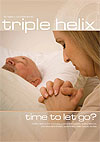'It was terrible – people were just lying beside the road, with nowhere to go. Children were on the ground, scraping up bits of rice that someone had dropped. People were drinking the flood water.' Dr Nadeem Hidayat described the scenes he witnessed the day the flood swept through Pakistan's Khyber Pakhtunkhwa Province.
Nadeem is the Medical Superintendent of Pennell Memorial Christian Hospital (PMCH) which CMF supported during the initial crisis this summer, and we were privileged to meet him during his November trip to the UK. He went on to tell us: 'Three days later we ran our first clinic in the camp. People were suffering from diarrhoea and vomiting, there was a lot of malaria and typhoid fever. Many had terrible wounds – we were asked to help a woman whose house had collapsed on her. Falling beams had crushed her and I had to amputate both her hands. She is still in the hospital with her six children as she has nowhere to go – some of the staff are bringing her food. We don't know how many others there are like her.'
The worst humanitarian crisis
The floods have created the worst humanitarian crisis in recent times, with 20 million people affected – more than the 2004 tsunami and the earthquakes in Kashmir and Haiti put together. In September we considered whether there was anything CMF could do to help in this devastating situation. We are not an aid agency, but as part of a worldwide fellowship of Christian doctors we are in the unique position during health crises of being in direct contact with doctors living and working on the frontline.
Dr Nadeem at PMCH and Dr Haroon Lal Din at Kunhar Christian Hospital in northern Pakistan are both CMF members in flood-affected areas. We launched an appeal within the membership to support these two hospitals and were amazed by the response – we reached our target of £20,000 in five days. Even after the appeal was closed, members continued to send donations and altogether we have raised £28,700 which will enable us to help in other places as well. The £16,000 we have sent to PMCH has provided two months' food, water and drugs for 200 families – almost 2,000 people. It has been a great privilege to stand with our Pakistani colleagues in this way, and through them to help some of those who have suffered from this tragedy.
Pennell Memorial Christian Hospital
PMCH has a long legacy of service since it was founded 117 years ago by pioneer missionary Dr Theodore Pennell. But it is not an easy place to work – near the border of the lawless Federally Administered Tribal Area where the Taliban are active, the area has been a victim of extremism, terrorism, military operations and natural disasters for the last couple of decades. Nadeem explained:
'Many NGOs are afraid to work in these areas. Due to security issues, it's difficult for me to leave the hospital – I am visiting flood victims with a van full of army guards. The former Medical Superintendent was kidnapped by the Taliban. But by the grace of God we are safe and it is my pleasure that we treat many war wounded Taliban in our hospital so we have a good reputation in this area.'
'Our province of Khyber Pakhtunkhwa is a divided community – the social and economic lives of the people are almost crippled due to economic uncertainty and political instability. The 'War against Terror' has further aggravated the peaceful lives of the local people, and there are divisions between liberals and extremists, East and West, Muslims and non-Muslims. Most Christians are unskilled and poorly educated, living in slum areas. Economically they are the poorest of the poor. Christians in Pakistan are regarded as second class citizens.'
In the crisis of the flood, the hospital has tried to build bridges between the divided communities by providing food and gifts for Muslims at the end of Ramadan. Hospital staff gave two days' wages to provide the gifts, which included a portion of the Bible for any who wanted one. Ninety copies of the New Testament and 250 Gospels of John were given out.
Where no other doctor would go
I asked Nadeem why he has chosen to work in this difficult place, when he could have chosen easier and more profitable options. He replied 'It has always been my aim to work in a mission hospital. I wanted to work where no other doctor would go. I pray with every patient – these people really need God. I want to stay longer – as long as God can use me there.' Praise God for doctors like Nadeem, willing to bring the love of God and the light of the gospel to hard places – places where other doctors won't go.
































